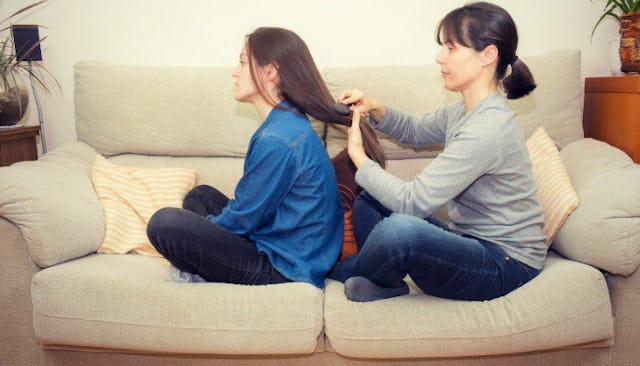Battling Lice...In High School

Lice. Just saying the word makes me scratch my head. Once you have seen a few creatures crawling on your kid’s head, you will never rid yourself of the itchy-head feeling when you hear, say, or write the word lice.
We escaped lice in elementary school. I thought that since my kids entered high school without ever getting lice, we were in the clear. After all, they wash their hair frequently. I wash sheets fairly regularly and launder clothes almost every day. Who would even consider it a problem to watch out for by the time they reached the teen years?
Was I ever wrong.
One night at 9 p.m., I picked up my daughter up from rehearsal. She jumped in the car, sweaty and hungry, and we started the banter we often have about homework and her day. She casually scratched her head and said, “Mom I have picked, like five bugs out of my hair today. I even squished one on my notebook at school and blood squirted out.”
What!
I practically rear-ended the car in front of us as I slammed on the breaks. “Are you kidding me? That’s lice!” I screamed at her. No joke, I sped the remaining five blocks home, got her in the house, and pulled out a flashlight. Well, it turned out no flashlight was needed because when I flipped her hair to the side to examine her part, there they were. Creepy crawlies. Lice.
I sped off to the drugstore, found a pharmacist, and came home with two boxes of lice-killing-pesticides and a number of tea tree oil grooming products. By this point she was crying as she sat in an empty bathtub waiting, scratching her head. I Googled “how to treat lice” and started the first of many loads of laundry, bagging all of her jackets, throwing other things in the freezer, and vacuuming the house until the wee hours of the morning.
She slept naked that night, with her head smeared with coconut oil and a plastic bag tied on her head—just in case.
Now that I am much better versed in lice, I know that this wasn’t necessary. Essentially, once you have treated your child with the proper products, they are safe to go back to school. I combed her hair with the nit comb for the next five days, which is crucial. While I kept finding more eggs and carcasses, no one else in our family got lice. They need blood from your scalp in order to survive. They don’t jump from your bedding or jackets. They are lazy little critters that will die in 24 to 48 hours if they don’t find a scalp to munch on. We figured out that my kid probably got it from head-to-head contact with another kid when she went to a sleepover exactly two weeks prior, which is the gestation period for lice.
Aside from my drugstore treatment regimen, there are plenty of services out there too—they will come into your home and take care of the problem for you. Many of these services are guaranteed, so if they don’t get them all the first time, they will come back and treat them again until the bugs are eradicated.
The main thing I learned during this small crisis is that lice are not choosy about which head they latch onto—they just need a head. So no matter how clean you are, how old you are, how much you wash your sheets, you too can be affected. If you suspect that you or one of your kids may have it, check for nits. They may look like dandruff, and if you can flick it off, it’s generally not a nit. Nits stick to the hair shaft. And lice bugs are not white, but brown and look similar to a sesame seed. Getting lice is a nuisance but not a medical problem.
If you have escaped a lice episode in elementary school, consider yourself lucky like I was. But know that you still aren’t out of the woods. It can happen at any age. Watch for the warning signs, be prepared, take a deep breath, and deal with it.
This article was originally published on